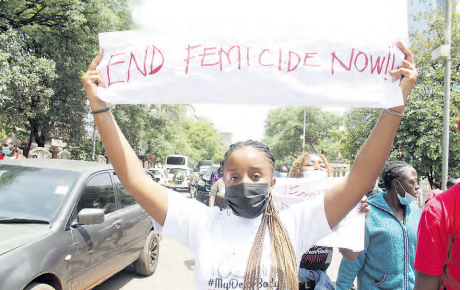

The push to end violence against women and girls in the country has received a major boost after a new continent-wide convention to end the scourge came into effect on Wednesday, May 28.
However, Parliament must first ratify the African Union Convention on Ending Violence Against Women and Girls to domesticate and make it legally operable. Kenya is already a signatory to the convention.
President William Ruto was part of the assembly of heads of state that adopted the convention this February during the AU Summit in Addis Ababa.
Indeed, violence against women and girls remains a pervasive problem in Kenya.
The 2022 Kenya Demographic and Health Survey, about four in 10 women have experienced physical violence, and more than one in 10 have faced sexual violence.
The survey revealed that 34 per cent of women aged 15 to 49 have experienced physical violence since the age of 15 and 16 per cent of them reported experiencing physical violence in the 12 months preceding the survey.
Additionally, 13 per cent of women in this age group have faced sexual violence during their lifetime, with 6.4 per cent reporting such experiences in the past year. Many cases go unreported due to stigma, fear of retaliation, or mistrust in the justice system.
Gender equality and anti-gender-based violence advocates now shift focus on pressing the government to roll out the process of domesticating the convention to enable them use the courts to enable Kenyan girls and women enjoy it.
Grace Wanjiku, a grassroots champion of girl’s rights in Nanyuki, said regional mechanisms are critical in helping develop pressure initiatives to force governments to act.
“The convention coming to force on May 28 is a blessing for the women and girl’s rights movement because it is an addition to our arsenal in this fight for our rights. The more the tools in our bags the better,” she said.
“A continent-wide legal tool give us opportunity for solidarity building across region and the continent, and also, a platform for getting attention of the continent’s governance structures if we feel enough is not being done in Kenya in eliminating violence against girls and women.”
Described as a landmark legal instrument, the convention aims to provide a comprehensive, legally binding framework for preventing and eliminating all forms of violence against women and girls across the African continent.
It addresses both prevention and response—focusing on root causes, strengthening legal and institutional mechanisms, and promoting a culture of gender equality and respect for women’s rights.
“This is a historic step forward for Africa,” Bineta Diop, the AU Special Envoy on Women, Peace, and Security, said. “We now have a powerful tool to hold states accountable and ensure that women and girls live free from fear, violence, and discrimination.”
The convention targets multiple forms of violence—physical, psychological, sexual and economic—including domestic abuse, female genital mutilation, early and forced marriage, sexual violence in conflict zones, workplace harassment and online abuse. It also seeks to address intersecting forms of discrimination based on race, ethnicity, age, disability, or socioeconomic status, ensuring no woman or girl is left behind.
In Kenya, the convention is being welcomed as a critical reinforcement of ongoing national efforts.
“We have progressive laws like the Protection Against Domestic Violence Act, the Sexual Offences Act and the Prohibition of FGM Act, but implementation has been inconsistent,” gender rights activist Beatrice Okumu of the Women’s Justice Forum said.
Policy experts argue the convention not only encourages states to harmonise laws and policies but also urges them to invest in survivor-centered services—such as shelters, psychosocial support, legal aid and safe reporting channels.
“It’s about creating an ecosystem that supports survivors and deters perpetrators,” AU Gender Directorate head Prudence Ngwenya said.
For Kenya, ratification would align the country’s commitments with its leadership role in pan-African gender justice. It would also build on earlier initiatives like the AU Campaign to End Child Marriage and the UN Spotlight Initiative, which Kenya joined in 2019.















